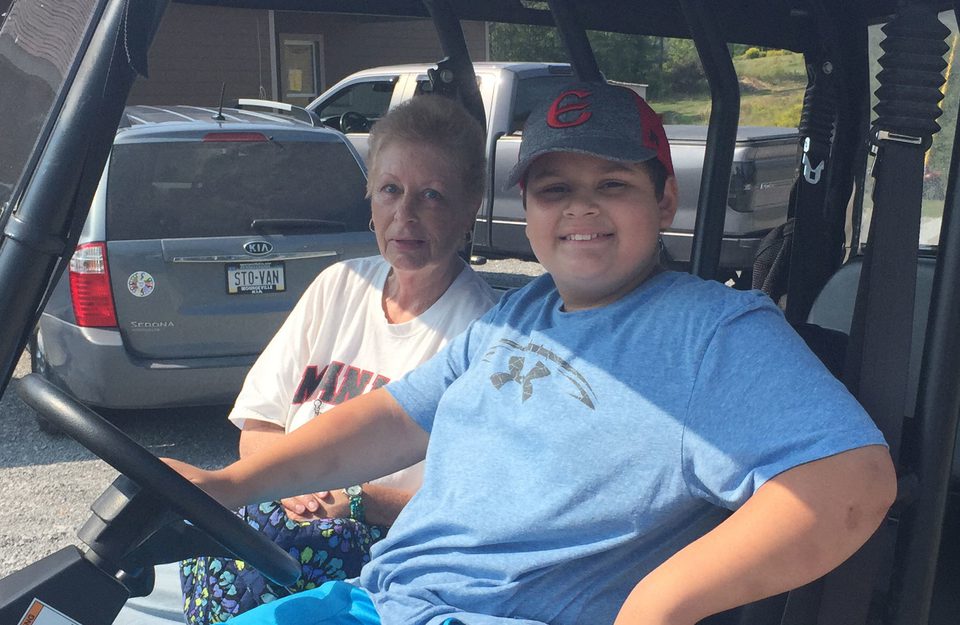Never Losing Hope: Ovarian cancer survivor shares her story

Jan Stojanovic is many things. She’s a grandma, a painter, a former synchronized swimmer, and an ovarian cancer survivor. “I’m grateful every day when I wake up that I’m breathing and I’m here,” Jan says.
In 2014, Jan noticed changes in her body that alarmed her. “I was bloated, felt very full, and I experienced pain in my back and side. I realized these symptoms were all markers for ovarian cancer.” She contacted her gynecologist and had a transvaginal ultrasound. It was a life-changing moment. “I about inhaled all of the oxygen in the room when I looked at the screen. I could see the masses in my body. Afterwards, I sat in the parking lot for half an hour just trying to take it all in,” she says.
Jan’s official diagnosis was stage 3c ovarian cancer. “That diagnosis is devastating because you aren’t guaranteed a tomorrow,” Jan shares. She was referred to Magee-Womens Hospital of UPMC where she met with Dr. Madeleine Courtney-Brooks, a gynecologic oncologist. “By the luck of the draw, I got Dr. Courtney-Brooks. She’s such a special doctor. I appreciated her calming demeanor and how straight forward she was with me,” Jan says.
Dr. Courtney-Brooks admits that she is a straight shooter when talking to her patients and their families. “My job is to be forthcoming with the information we have in regard to treatment options, prognosis and survival rates, but still being positive and making sure patients know that there are people beating the odds. My goal with every patient is to make them one of those people who beat the odds,” Dr. Courtney-Brooks says.
Ovarian cancer is one of the deadliest cancers because there is no effective screening method yet. Due to that, most cases are diagnosed when they have already progressed to the most advanced stages. “As of now, there is no blood test, ultrasound, or other effective tool to diagnose ovarian cancer,” says Dr. Courtney-Brooks, “Many of the symptoms can be very vague and subtle so it is challenging to pinpoint.”
Jan feels lucky that her cancer was caught earlier than most cases. “I believe that’s what has given me a leg up in my journey. I know many women who had it at stage 4 who have since passed away. It’s so important to listen to your body and not be afraid to set up an appointment with your doctor,” Jan says.
After undergoing surgery and months of chemotherapy, Jan was exhausted and the treatments took an emotional and physical toll. But she had a very important reason to keep fighting: her grandson, Shane. “I told Dr. Courtney-Brooks from the beginning that I was in for the fight. I have one grandchild who is very special to me. I want to see him grow up and get married,” Jan says. Shane even sat with Jan through her chemotherapy appointments. “I told him it would be pretty boring, but he insisted on coming with me. He is a really resilient kid.”
A little over a year after her diagnosis, Dr. Courtney-Brooks called with good news. Jan was in remission. She’s been in remission for 2 years now. “It’s been an amazing journey. I feel wonderful today. I am on a surveillance plan and still listen to my body. I have some side effects from the treatments, but I am so thankful,” Jan says.
One thing that Jan and Dr. Courtney-Brooks feel strongly about is that despite what you hear about ovarian cancer, there is a lot of hope. “It’s a challenging disease but we have patients who are 5 and 10 year survivors. We’re learning new treatment options all the time so we are really proactive about treating our patients.”
Jan agrees, “This doesn’t have to be a death sentence. Treatment is difficult but you need to have faith that what’s being done will help you over this hurdle.” She also says she wouldn’t change what happened to her. “I wouldn’t trade a minute of this experience because of all I have learned and the wonderful people I’ve been in contact with. From the housekeeping staff to all the nurses, I couldn’t have been treated more compassionately at Magee.”
There are some exciting developments in ovarian cancer research and Magee is leading the way. Magee-Womens Research Institute (MWRI) recently received a generous grant from the Eden Hall Foundation to fund a new Center for Ovarian Biology that will establish MWRI as the leading authority on early detection and treatment of ovarian cancer.
Jan is optimistic about the future. “Someday, somehow, and hopefully in my lifetime, I will see a day when the number of ovarian cancer patients goes down and the number of survivors goes up.”
Be the First to Know
Get the latest research, news, events, and more delivered to your inbox.